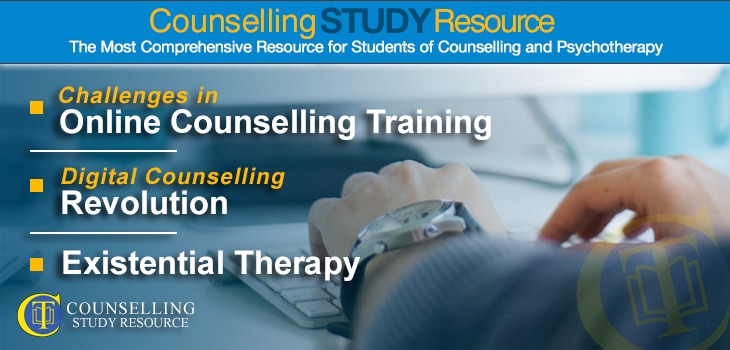Certificate in Online & Telephone Counselling
Get expert training from the Counselling Tutor team on how to transfer face-to-face skills to work safely and ethically online and via telephone

Welcome to episode 159, the first in our brand-new series of the Counselling Tutor Podcast. In this episode, Ken Kelly and Rory Lees-Oakes discuss the challenges of online counselling training where much of the input is provided remotely.
Then, in an innovative new slot ‘The Digital Counselling Revolution’, the presenters look at where counselling is going in the era of social distancing and reduced opportunity for face-to-face contact.
Last, ‘Practice Matters’ focuses on existential therapy, with input from guest lecturer Professor Mick Cooper.
Counselling is different from many other fields of study in that it can be very challenging for students and teachers alike to switch to remote learning and teaching.
The current COVID-19 pandemic has led to a need to adapt quickly to this new way of working.
Students are facing huge challenges never seen before. Indeed, recent research by Professor Susanna Loeb at Brown University shows that online classes are generally less effective than in-person teaching for most learners, and particularly for those with weaker academic backgrounds.
One of the key losses in online learning is that of peer support. Indeed, the Education Endowment Foundation found that peer interactions can provide motivation and improve learning outcomes.
So what can you do to help yourself in this brave new world, particularly with regards to online counselling training? Ken and Rory suggest the following:
In summary, it’s important to take your online studies just as seriously as you would when studying in the classroom.

Get expert training from the Counselling Tutor team on how to transfer face-to-face skills to work safely and ethically online and via telephone
In this new slot for this academic year, we will be exploring lots of different aspects of technology-assisted therapy, a hot topic in the world of counselling and psychotherapy.
Counselling online is a very different environment than counselling face-to-face – and so change is needed in order to be able to adapt to this new way of working, and to do so safely, effectively and ethically. As with all change, there can be ‘pain in the pivot’.
Counselling Tutor has created a course, Online and Telephone Counselling, to support you in this. Offering over 80 learning hours, it meets the BACP’s competences for telephone and e-counselling.
Key to pivoting successfully to online working is having an online mind-set ourselves.
Feeling that online counselling is less effective than face-to-face working may well undermine the therapeutic relationship and/or our clients’ confidence in their therapy.
Research suggests that it is perfectly possible to achieve positive and meaningful outcomes for clients by working online. Does this feel true for you? And if not, might this reflect your own relationship with technology?
As Rory points out, technology and counselling are in fact long-established partners, with Carl Rogers using technology to audio-record and film counselling sessions many years ago as a way of helping practitioners to learn and develop.

Get on-demand Certified CPD that is implementable in your practice
In this part of the Counselling Tutor Podcast – aimed at supporting qualified practitioners to sharpen their competence – Rory talks to Professor Mick Cooper, whose lecture on existential therapy has recently been added to the Counsellor CPD library.
Mick provides an introduction to existential therapy, its routes in existentialism (a branch of philosophy), and how many of the core ideas can be applied by therapists in any modality.
Mick and Rory also discuss:
Developing an Online Mindset